Mahatma Ghandi, Winston Churchill, Benazir Bhutto. Three iconic political figures who each touched the lives of scores of people around the world during their illustrious lives. What is perhaps lesser known is that all three feature in Chatham House Online Archive, having contributed in one form or another to the world-renowned UK think tank. Ranked the second most influential think tank globally in 2015, Chatham House has offered the perfect platform for leading thinkers in their fields to voice their thoughts on the international affairs of the day.
As the EU Referendum in the UK draws ever nearer, and the ‘yes’ and ‘no’ campaigns gather pace, I took the opportunity to delve into Chatham House Online Archive; its comprehensive coverage of over 80 years of international affairs includes the last UK referendum in 1975, which saw a two-thirds majority in favour of continued European Economic Community (EEC – the precursor to the EU) membership. Looking at five pieces of content from a range of contributors reveals some intriguing insights, and continuities, which have characterised Britain’s relationship with Europe over the past forty-four years.
-
-
-
- Contributor: Z. Young
Position: Head of International Affairs in the House of Commons library
Content: Journal article; ‘Britain in the European Community: the View from Right and Left’, The World Today, Vol. 29, Issue 7
Year: 1973 (a year into Britain’s membership of the EEC) In his World Today article, S. Z. Young drew attention to the overarching concerns which were uniting the pro- and anti-Europe factions within Britain. Although there were some protracted quarrels which were, unsurprisingly, ongoing between Right and Left of the political spectrum, the two sides agreed on issues such as the inequity of the Common Agricultural Policy (CAP), resistance to agricultural price rises, and reluctance to support EEC sugar production. British uncertainty, even hesitancy, is an overriding theme emerging from Young’s article. As he explained, ‘British activity in Brussels so far has had more the appearance of minimising the damage of community membership than of building new and positively describable programmes’. It was ultimately the ambiguous political positioning of the EEC, made up of six countries as it was at the time, which was holding Britain back from wholehearted engagement with its recently-established community membership.
In his World Today article, S. Z. Young drew attention to the overarching concerns which were uniting the pro- and anti-Europe factions within Britain. Although there were some protracted quarrels which were, unsurprisingly, ongoing between Right and Left of the political spectrum, the two sides agreed on issues such as the inequity of the Common Agricultural Policy (CAP), resistance to agricultural price rises, and reluctance to support EEC sugar production. British uncertainty, even hesitancy, is an overriding theme emerging from Young’s article. As he explained, ‘British activity in Brussels so far has had more the appearance of minimising the damage of community membership than of building new and positively describable programmes’. It was ultimately the ambiguous political positioning of the EEC, made up of six countries as it was at the time, which was holding Britain back from wholehearted engagement with its recently-established community membership.
- Contributor: Roy Jenkins
Position: MP, Leader of the Social Democratic Party (SDP), former President of the European Commission
Content: Article; ‘Britain and Europe: Ten Years of Community Membership’, International Affairs, Vol. 59, No. 2
Year: 1983 As former President of the European Commission (1977-1981), it was with some authority that Roy Jenkins offered his thoughts on Britain and Europe. Surveying ten years of EEC membership, Jenkins delivered a somewhat pessimistic message, with British disengagement a pervasive thread. Of particular interest given the current Referendum is his sentiment that the ‘in/out’ argument was too prevalent, dominating British politics at the expense of meaningful activity within the Community. Thus Britain had adopted a rather noncommittal approach to the EEC. That Jenkins even discussed the prospect of British withdrawal just ten years into its membership – and only eight years after a national referendum endorsed membership by a majority of two to one – speaks volumes of the turbulence which has characterised relations over the past forty years. Recent debates on continuing EU membership, set in this context, seem to be nothing new; the upcoming Referendum becomes merely the latest in a long line of political discussions.
As former President of the European Commission (1977-1981), it was with some authority that Roy Jenkins offered his thoughts on Britain and Europe. Surveying ten years of EEC membership, Jenkins delivered a somewhat pessimistic message, with British disengagement a pervasive thread. Of particular interest given the current Referendum is his sentiment that the ‘in/out’ argument was too prevalent, dominating British politics at the expense of meaningful activity within the Community. Thus Britain had adopted a rather noncommittal approach to the EEC. That Jenkins even discussed the prospect of British withdrawal just ten years into its membership – and only eight years after a national referendum endorsed membership by a majority of two to one – speaks volumes of the turbulence which has characterised relations over the past forty years. Recent debates on continuing EU membership, set in this context, seem to be nothing new; the upcoming Referendum becomes merely the latest in a long line of political discussions. - Contributors: Lord Plumb MEP and Sir Michael Franklin
Positions: Former President of the European Parliament (Plumb) and Former Deputy Director General of the European Commission (Franklin)
Content: Speech; ‘The European Community and Britain’s Rightful Place’
Year: 1990
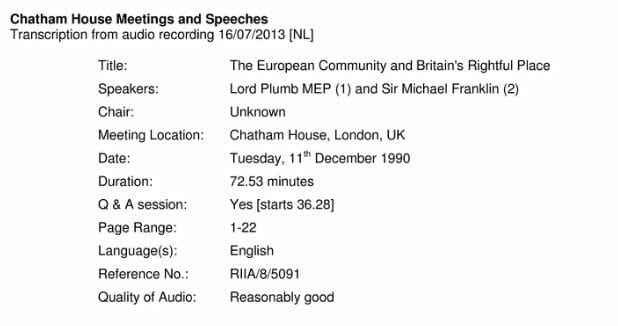
Speaking at Chatham House in 1990, Lord Plumb and Sir Michael Franklin expressed their views on Britain’s role in the EEC. Both speakers shared a concern that Britain was not making the most of its Community membership – a theme which can be traced in Young’s and Jenkins’s above articles. Plumb nevertheless offered an optimistic message on the prospects of greater British activity in European affairs. He highlighted the Conference on Security and Cooperation in Europe and widening commitment to third world countries as two significant opportunities for greater British involvement on the European agenda. The conference, in particular, was deemed a ‘once in history opportunity to recapture the European ideal with a positive vision of a new Europe’. Franklin spoke similarly, believing that it was greater gusto which was the key to future British engagement in Europe. This would, he argued, ensure a smoother relationship between Britain and the various member states, with the former more receptive to the adoption of new policies. Plumb and Franklin’s more optimistic message at the advent of the 1990s stands in contrast to the more pessimistic articles above.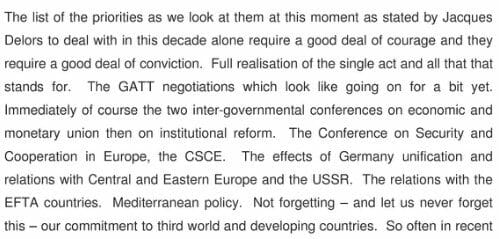
- Contributor: Martin Wolf
Position: Financial Journalist, subsequently awarded a CBE for services to financial journalism
Content: Conference Series; ‘How Cold Will Life be Outside EMU?’, European Economic and Monetary Union: Markets and Politics under the Euro: Proceedings, Millennium Conference Centre, London, 26 & 27 November 1998
Year: 1998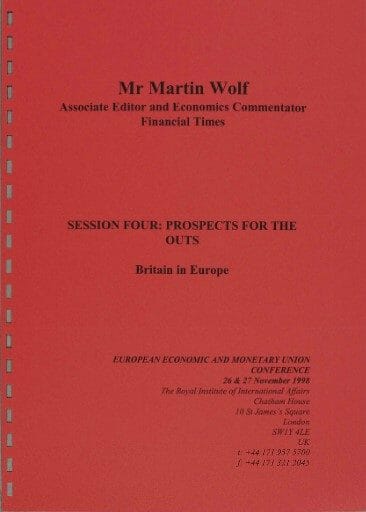
Martin Wolf, Associate Editor and Economics Commentator for the Financial Times, delivered his Chatham House conference paper in the midst of political debate surrounding Britain’s membership of the European Monetary Union (EMU). If it joined the EMU, assumption of the Euro would be a given; if not, then it would remain with the pound. Much like the ‘yes/no’ campaigns which are in full swing today debating Britain’s EU membership, there were in 1998 determined factions on each side; Wolf drew attention to the ‘scare mongering’ he perceived on the ‘yes’ side if Britain remained outside of the EMU. He highlighted higher interest rates and a more exposed currency as two downsides to non-membership, as argued by advocates of the ‘yes’ campaign. Yet Wolf was keen to consider the question more broadly, going deeper to address the UK’s ‘fear’ of being excluded from the EMU, and whether it would be acceptable to delay its decision. In a parallel to its attitude towards the EEC more generally (as indicated by the earlier document above), British enthusiasm towards EMU membership was conspicuous for its absence. Politically and economically, Wolf claimed that ‘fear of exclusion’ was the principal motivator behind membership, rather than any active desire to participate. This was part of a more general indifference towards the continent, making Wolf’s paper a useful micro-study into British relations with Europe. Setting this in the context of Plumb and Franklin’s earlier optimism suggests that attitudes towards Europe had changed very little in Britain during the 1990s.
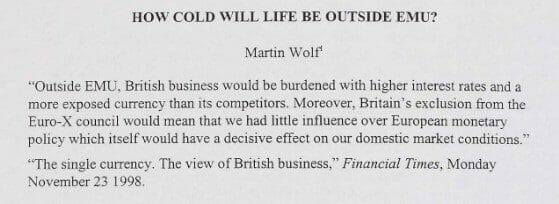
- Contributor: Kenneth Clarke
Position: MP, former Chancellor of the Exchequer
Contribution: Speech; ‘Britain’s Role in the New Europe’
Year: 2003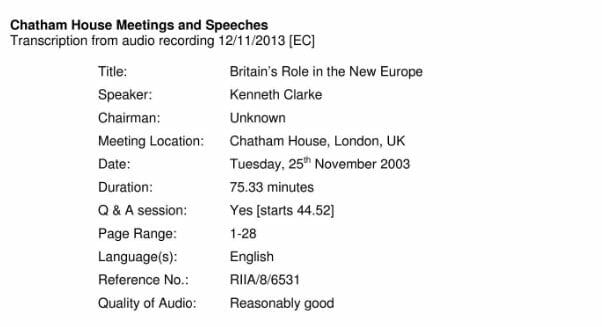
Exactly five years after Wolf’s paper, former Chancellor Kenneth Clarke delivered
a Chatham House speech addressing Britain’s role in the ‘new’ Europe. In those five years, Britain had opted against membership of the EMU, staying away from the Euro and becoming instead an ‘opt-out EU member’. The EU was itself changing, with a draft Constitution introduced to clarify EU objectives, powers and institutions (it was adopted the following year). Clarke referred to the ‘semi-detached’ role which the UK had played in Europe to date, acting chiefly as a bridge between the US and the rest of Europe. The problems inherent in this role for the British were worsened by the perceived hostility among US politicians towards further European integration. With Britain consequently left balancing US appeasement with that of its fellow member countries, what effect would this have on Britain’s own position in Europe? Rather than take a pessimistic approach though, Clarke in fact sees grounds for optimism, claiming that there were new possibilities for Britain in the recently enlarged EU. One of these was ameliorating the growing tensions between large and small member nations by showing its support of the likes of Ireland, the Scandinavian countries, and some Central European nations. With the EU’s desire to adopt a more cohesive approach to foreign and security policy firmly aligned with British interests, Clarke was ultimately confident that Britain would have a growing role in the future dictation of EU policy.
However, knowing as we do today that relations between Britain and the EU continue to dominate political discussions, the reality over the past decade has perhaps been a little more complex. Whatever the outcome of the upcoming Referendum, these five Chatham House insights point towards continuing discussions for the foreseeable future.
- Contributor: Z. Young
-
-


